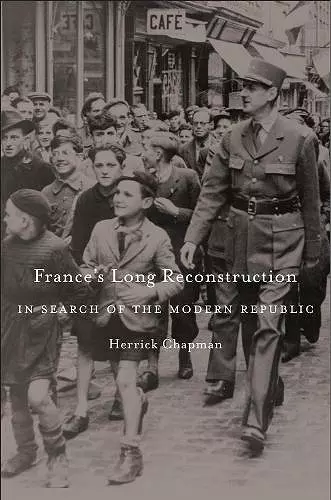France’s Long Reconstruction
In Search of the Modern Republic
Format:Hardback
Publisher:Harvard University Press
Published:26th Jan '18
Currently unavailable, and unfortunately no date known when it will be back

At the end of World War II, France’s greatest challenge was to repair a civil society torn asunder by Nazi occupation and total war. Recovery required the nation’s complete economic and social transformation. But just what form this “new France” should take remained the burning question at the heart of French political combat until the Algerian War ended, over a decade later. Herrick Chapman charts the course of France’s long reconstruction from 1944 to 1962, offering fresh insights into the ways the expansion of state power, intended to spearhead recovery, produced fierce controversies at home and unintended consequences abroad in France’s crumbling empire.
Abetted after Liberation by a new elite of technocratic experts, the burgeoning French state infiltrated areas of economic and social life traditionally free from government intervention. Politicians and intellectuals wrestled with how to reconcile state-directed modernization with the need to renew democratic participation and bolster civil society after years spent under the Nazi and Vichy yokes. But rather than resolving the tension, the conflict between top-down technocrats and grassroots democrats became institutionalized as a way of framing the problems facing Charles de Gaulle’s Fifth Republic.
Uniquely among European countries, France pursued domestic recovery while simultaneously fighting full-scale colonial wars. France’s Long Reconstruction shows how the Algerian War led to the further consolidation of state authority and cemented repressive immigration policies that now appear shortsighted and counterproductive.
A fascinating new history of the Fifth Republic. -- Adam Gopnik * New Yorker *
[An] absorbing study of France’s state-led economic and social regeneration in the decades following the Second World War…Chapman finds Tocquevillian elements of continuity across the whole period, and argues provocatively that the events of 1958 were much less consequential when seen in terms of their effect on state power. -- Sudhir Hazareesingh * London Review of Books *
Although much work has been done on the history of France since the war, Chapman’s focus on policy offers new insights on familiar terrain. In focusing on the tensions between top-down technocratic reform and bottom-up democratic reform, he has radically changed the paradigm through which we see this history. After Chapman’s France’s Long Reconstruction, we will never look at French history in the same way again. -- Hugh Drochon * The Nation *
A powerful and original revision of the conventional narrative of the rebuilding of France after the Second World War. Chapman examines a fundamental question about modern democracy, namely how to reconcile administrative expertise with democratic participation. The book reminds us that democratic consensus does not necessarily beget coherent or effective policy. This is an important contribution to the history of modern Europe. -- Richard Kuisel, Georgetown University
In this impressive book, Chapman traces the very process by which contemporary France was constructed. He shows that postwar reconstruction was an evolving and unending trial between state leadership and democratic practice to work out the limits of each. The contestation between top-down power and bottom-up participation not only persisted; the one fed upon the other’s initiatives and reactions and thus deepened and institutionalized, bequeathing to contemporary France the distinctive state–society relationship that governs to the present day. -- Michael B. Miller, University of Miami
This compelling book demonstrates how France’s postwar order was as much created from below by an activist citizenry as it was created from above by experts. Chapman takes a long-term perspective that allows him to detail the continuities between the Fourth and Fifth Republics as well as to highlight the impact of the Algerian War on the strengthening of executive power. Essential reading for anyone interested in the history and politics of postwar France. -- Philip Nord, Princeton University
Chapman explores the famous fractiousness of modern French politics from a variety of different perspectives. At the heart of these conflicts he finds a sharp and enduring tension between technocracy and democracy, between the goals of intellectuals, government leaders, and planners on the one hand, and a variety of popular interest groups on the other. This is an excellent study of how a nation sought to rebuild itself after catastrophe, to plan for the future rather than replicate the past, and how it did and did not succeed in attaining that goal. It is a fascinating tale, with important implications for our own time. -- Tyler Stovall, University of California, Santa Cruz
A thoroughly readable and well informed study of post–World War II French history. -- Carl Cavanagh Hodge * Michigan War Studies Review *
ISBN: 9780674976412
Dimensions: unknown
Weight: unknown
416 pages